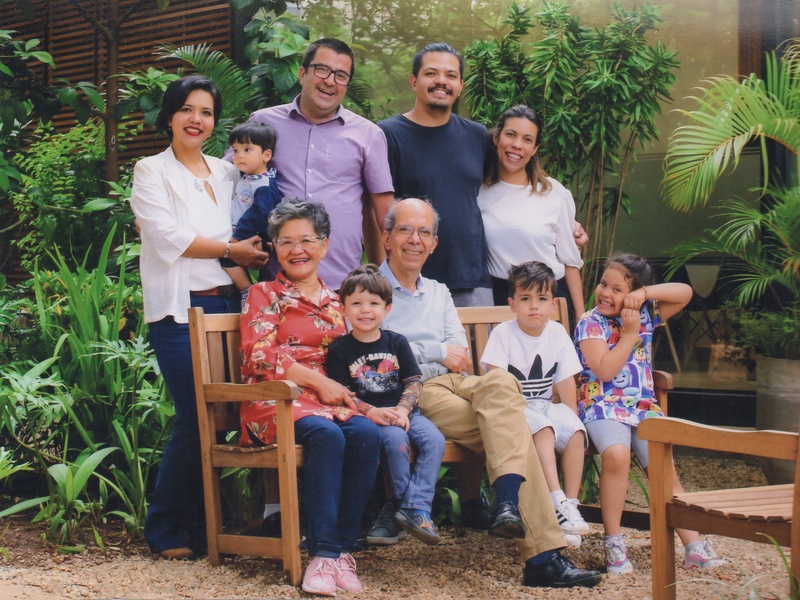So many decades have passed, more than seven, and there will certainly be many more to come. At that moment, I decided to gather up my courage and dive into my own existence. Into my own “black hole” (an expression I borrowed from cosmology) and dive headfirst into my memories and research my family lineages.
The truth is that these questions have not been resolved for a long time and I am still looking for answers, but what is concrete is that a mokuteki (intention, objective) was awakened in me after the birth of my children: Sílvia (1981), Pedro (1985); my grandchildren: Helena (2015), Tomás (2016), Daniel (2018) and Raul (2021) who represent the miracle of my Life.
My writing will be the small legacy I leave to my direct descendants and to those who will come in the future, and I illustrate it with a phrase attributed to the Greek philosopher Heraclitus of Ephesus: “Everything flows, nothing persists, nor remains the same. Being is nothing more than becoming.” For him, only change and movement are real and the identity of things that are the same is illusory: for him, everything flows. Ironically, they say that forgetting is part of Life. So I ask myself: Can we prevent or delay this process? What was relevant to me?
I had a dream that helped me reflect on this:
I was sitting holding a sheet of paper with scribbles on it, scribbles that I couldn't see clearly and to make matters worse, the lenses of my glasses were dirty. Suddenly, an elderly woman appeared and took my glasses off, cleaned them and gave them back to me. When I put them on, I was able to differentiate Eastern characters from Western ones. And then I woke up...
From that dream, the desire to understand and give new meaning to my existence emerged: my mokuteki was born – the desire to tell the story of my origin before it is erased and sucked into the “black hole”.
I was born in 1950 to my parents, Japanese immigrants, who met through miai-kekkon and got married here in Brazil, in the city of São Paulo, in 1949.
My birth certificate states Glória Megumi Omori, born on July 12, 1950, daughter of Midori Omori and Mutsuho Omori, maternal grandparents Masaru Matsumoto and Fujie Matsumoto and paternal grandparents Jinkichi Omori and Kimiye Omori, etc... and from 1979 onwards, Mendonça by marriage.
I have two first names: Glória, inspired by the name of the dye shop of my maternal relatives who, according to my mother, had already researched the meaning (honor, halo, bliss) and recorded it. And the second first name: Megumi (kindness, grace, charity, favor) would be the closest to the Japanese language.
I later learned that my father was “outvoted,” because he wanted to register me as Vitória, but Glória prevailed. And after resolving this disagreement, I was registered on the 12th and not on July 9th. Thus, my birthday can be celebrated on two dates (the actual date and the official date). In fact, I was born on July 9th for my family and those closest to me, and for the outside world (colleagues and friends from school and work, documents, etc.) the 12th is the official date.
My family, in addition to celebrating my birthday on July 9th, still treats me as Megumi-tian, a moment in which I am identified as being part of Japanese culture, most of whom are unaware that in the outside world my first name is Glória and that the “m” in Megumi often appears abbreviated and that after marriage the “o” in Omori became a simple vowel and in this case a “Shakespearean” question arises: AM I or AM I NOT.... “Japanese” or “ Brazilian”?
What would be my true identity?
Glória Megumi,
Glória Megumi Omori,
Glória M. Omori,
Glória Omori,
Glória Megumi Omori of Mendonça,
Glória MO of Mendonça,
Glória Mendonca?
I confess that my entire life I have lived with this ambiguity regarding nationality: Japanese or Brazilian?
My physical appearance, my phenotype, is decisive: I am yellow, with black hair, now gray, almond-shaped eyes, a short Asian nose, and could perhaps be confused with some other ethnic group with Asian features (Korean, Chinese, Filipino, Thai, and others). However, if we disregard my physical appearance, just my spoken language, it is completely “Brazilianized”, without any accent that would reveal a different nationality, and the same occurs with my writing.
According to Japanese laws that adopted the “ jus sanguinis”, I would be a Japanese citizen, since my parents are legitimate Japanese and if they had registered me at the Japanese Consulate or Embassy, which did not happen. Since I was born on Brazilian soil, the Brazilian Constitution of 1988, in its article 12, states that:
ARTICLE 12. The following are Brazilians:
I – born:
a) Those born in the Federative Republic of Brazil, even if of foreign parents, as long as they are not in the service of their country
Leaving aside this controversy between Jus Sanguinis and Jus Solis, the truth is that this “ambiguity” has been part of my life since I was born, when they chose my compound first name: Glória Megumi. I have already carried a “Q” of “Japaneseness” within the Western Group and a “Q” of gaijin (non-Japanese, foreign) in the Eastern Group, and little by little I am discovering that I have a “hybrid” identity, which is common in a country like Brazil that welcomes immigrants of all nationalities, where any ethnic group gradually adapts to survive, trying to preserve its original culture and assimilate the other that welcomed its relatives.
I wonder if this is possible, to maintain civility, within respect and with gratitude?
Today, in the contemporary world, we are witnessing a great regression of nations and peoples, struggles and wars that involve manipulative political and religious ideologies that take advantage of an uninformed media that spreads “fake news” with the intention of destruction. I really do not understand how we got to this point!
We forget that the origin of the current man (us) descends from homo-sapiens , that we are survivors of an evolutionary process that emerged around 200 thousand years ago on the African continent and that there is no “pure”, “superior” or “inferior” race, that this adjective is being used in a distorted way, with other intentions.
I would like to point out that the Brazilian population since its “discovery” in 1500 by the Portuguese has been and still is made up of immigrants of the most varied ethnicities and the arrival of Japanese people from 1908 onwards and my family came for atypical and particular reasons: one was political and the other due to gambling debts, the Omori in 1927 and the Matsumoto in 1937.
By admitting that identity can be linked to “belonging” to the place where one lives, I conclude that I feel like another Brazilian with oriental traits, seeking to gradually rescue the Japanese culture of her ancestors, participating in special activities and events, readings, study groups, films and other modalities linked to Japanese culture to leave a small legacy for my descendants.
This is my mokuteki.
© 2024 Glória Megumi Omori de Mendonça
Nima-kai Favorites
Each article submitted to this Nikkei Chronicles special series was eligible for selection as the community favorite. Thank you to everyone who voted!











